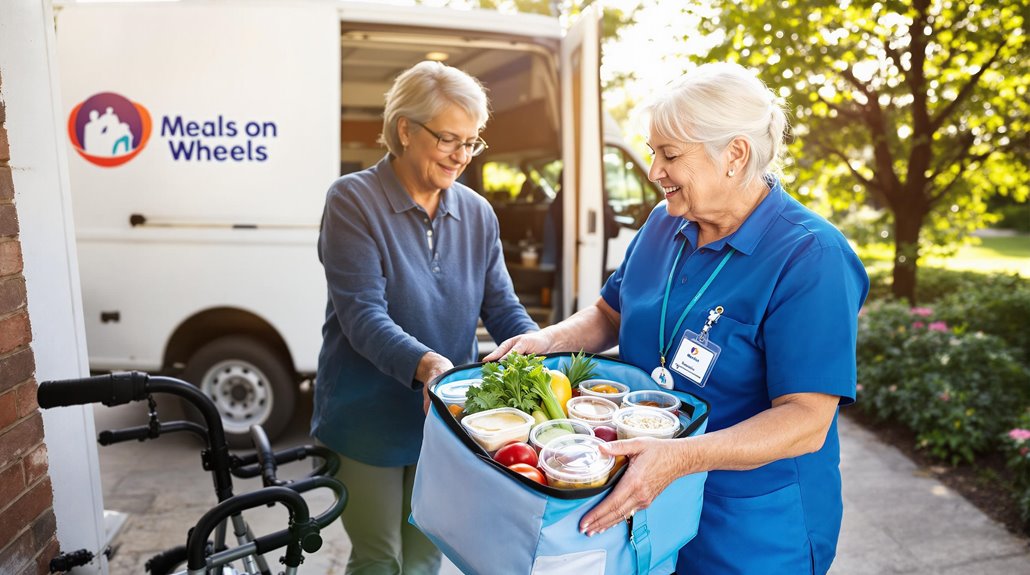Senior nutrition represents a critical challenge in today’s economy, with many older adults struggling to maintain healthy diets while managing limited budgets. Fortunately, an array of affordable meal delivery and grocery services has emerged to address this growing need. From government-sponsored programs to innovative private sector solutions, these services offer seniors access to nutritious, budget-friendly meals while accommodating various dietary restrictions and preferences. The key lies in understanding which options best serve individual circumstances.
Key Takeaways
- Meals on Wheels provides cost-effective nutrition at $1,000 per year, serving daily meals while offering significant savings compared to nursing facilities.
- Private meal delivery services like Magic Kitchen and MealPro offer specialized senior meals between $10-15 each with dietary accommodations.
- Grocery delivery services enable online price comparison and convenient shopping, helping seniors access fresh produce within budget constraints.
- Local organizations provide meal programs and nutrition education, connecting seniors with affordable food resources in their communities.
- Subscription-free ordering and rewards programs through meal delivery services help seniors minimize costs while maintaining nutritional quality.
Understanding Government-Funded Meal Programs

Government-funded meal programs serve as an essential lifeline for millions of American seniors, with the Older Americans Act (OAA) Title III-C Nutrition Services Program leading these important initiatives.
This extensive government nutrition system operates through two primary channels: congregate meal services at community centers and home-delivered meals for those with limited mobility.
The program specifically targets adults aged 60 and older, with special attention to low-income and socially isolated individuals.
Through public-private partnerships, these services deliver approximately 900,000 senior food portions daily nationwide, representing a critical source of both nutrition and social connection.
Local organizations coordinate meal distribution through Area Agencies on Aging, ensuring culturally appropriate options that meet dietary requirements while accommodating specific health needs and preferences.
Cost-Saving Options Through Meals on Wheels
While seniors face mounting financial pressures in today’s economy, Meals on Wheels stands out as a remarkably cost-effective solution for nutritional support and independent living. At approximately $1,000 per year per senior, the program delivers essential nutrition at a fraction of institutional care costs, leveraging efficient meal preparation methods and robust community partnerships to maximize resources.
The program’s thorough approach extends beyond food delivery, incorporating wellness checks and social interaction that help reduce healthcare expenses. Through centralized operations and volunteer networks, Meals on Wheels serves over 251 million meals annually while connecting seniors to crucial local services.
This integrated support system enables older adults to maintain independence at home, avoiding costly alternatives like nursing facilities while ensuring consistent access to proper nutrition.
Exploring Low-Cost Private Meal Delivery Services

Private meal delivery services have emerged as innovative alternatives for seniors seeking affordable, nutritious dining options that cater to their unique dietary needs.
Services like Magic Kitchen and MealPro offer affordable options ranging from $10-15 per meal, with some providers including dual portions in single containers to maximize value. These services feature extensive meal variety, accommodating specific dietary restrictions and health conditions such as diabetes and renal disease.
Cost-saving opportunities include subscription-free ordering, rewards programs that reduce per-meal expenses, and partnership programs with Medicare and Medicaid plans.
Companies like Mom’s Meals and Silver Cuisine further enhance affordability through meal combination packages and budget-friendly menu selections, while services such as Chefs for Seniors leverage local preparation to minimize delivery costs and maintain competitive pricing.
Health Benefits of Budget-Friendly Senior Meal Programs
Research-backed senior meal programs deliver substantial health benefits that extend far beyond basic nutrition, demonstrating a 31% reduction in hospitalizations and a 25% decrease in nursing home admissions among participants.
These programs provide essential nutritional benefits through carefully planned meals that support medication effectiveness and help manage chronic conditions.
Regular meal deliveries contribute to significant health improvements, including better physical strength, enhanced mobility, and reduced emergency department visits.
The wellness checks conducted during deliveries serve as a vital early warning system for potential health issues.
Additionally, these programs combat food insecurity while fostering social connections, as daily interactions with delivery staff help reduce isolation and depression among seniors, creating a thorough approach to both physical and mental well-being.
Qualifying for Free and Reduced-Cost Meal Services

Seniors seeking nutritional support through free and reduced-cost meal services must meet specific eligibility requirements, which vary by program and location.
Basic qualifying criteria typically include being at least 60 years old, residing in Sacramento County, and experiencing difficulties with meal preparation or mobility limitations. Income thresholds also play a role in determining senior benefits, with annual limits ranging from $23,475 for single-person households to $48,225 for families of four.
Special considerations extend eligibility to non-senior spouses of qualifying participants and individuals with disabilities living with seniors. Those who have recently experienced hospitalization or face ongoing health challenges may receive priority assistance.
Applications can be initiated through in-person enrollment, phone support, or with the help of family members and caregivers serving as advocates.
Special Diet Options for Health-Conscious Seniors
A thorough range of specialized meal options addresses the complex nutritional needs of aging adults, with particular attention to managing chronic health conditions and dietary restrictions.
Service providers offer meal customization focused on nutrient density, including heart-healthy, low-sodium selections and protein-rich options that support muscle maintenance. These carefully planned meals have demonstrated significant health benefits, with 79% of recipients reporting improved wellness outcomes.
Customized, nutrient-dense meals deliver proven health benefits, with specialized options supporting heart health, reduced sodium intake, and muscle strength.
The specialized diets are particularly valuable for the 94% of older adults managing one or more chronic conditions.
Calcium-enriched meals support bone health, while diabetic-friendly options help prevent complications.
Professional meal services also accommodate multiple dietary restrictions simultaneously, ensuring seniors receive ideal nutrition regardless of their health challenges.
Emergency and Holiday Meal Support Systems

While regular meal delivery services form the backbone of senior nutrition programs, extensive emergency and holiday meal support systems address essential gaps during times of heightened need or crisis.
These systems demonstrate significant impact through wellness checks and companion visits, reducing hospitalization rates by 31% among participants. During holiday seasons, when social isolation intensifies, specialized meal delivery services provide vital emotional support alongside nutritional assistance.
Community partnerships strengthen emergency support networks, enabling coordinated responses to food insecurity through evidence-based interventions.
Despite operating on limited budgets, these programs effectively reduce emergency department visits by 13% and help seniors age safely at home. Local organizations work diligently to minimize waitlists, which can extend beyond two years in some areas, by collaborating with regional partners to maximize resource allocation and service delivery.
Making the Most of Local Food Assistance Programs
Understanding how to maximize local food assistance programs remains essential for older adults facing nutritional challenges.
Through strategic local partnerships and targeted outreach initiatives, seniors can access extensive nutritional support that extends beyond basic SNAP benefits.
- Community gardens provide fresh produce while fostering social connections
- Senior farmers market programs offer double-value incentives for healthy food choices
- Mobile assistance services help homebound seniors access grocery delivery
- Cultural and language-specific support guarantees diverse communities receive equal access
Bottom Line
Affordable meal and grocery services provide essential nutritional support for seniors living on fixed incomes. Through a combination of government-funded programs, private delivery services, and local food assistance initiatives, older adults can access healthy, budget-friendly meals that meet their dietary needs. These services not only guarantee proper nutrition but also promote independence, reduce healthcare costs, and enhance the overall quality of life for America’s aging population.




